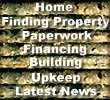
DISASTERS ... BASIC PLANNING
It‰s Hurricane Season, and we know what to do to be prepared Ö right? Well, perhaps. Hurricanes aren‰t the only catastrophes we may face that would affect our homes and lives - regardless of where we live on this earth, there is the potential of a tornado, a fire, an earthquake, a blizzard or a flood. All of us can do certain things to be prepared. This article is going to deal with some basic planning that is appropriate for all of us regardless of where we live. This is the beginning of a series of articles on the subject and deals with things you can do today that take very little time and money. Things we all need to do - so GET GOING!
1. COMMUNICATIONS - If a disaster befalls your town, chances are that the phones will be hard to use. You won‰t be able to call all of your relatives to tell them you are ok, and if they are also affected, they may not be able to receive a call from you anyway. Select a relative or friend who lives out of the path of danger - perhaps in Mexico or in the US and have them be your information clearing house in the event of disaster. They can take calls from each relative, note where they are, whether they are injured and all those things you will want to know about your family and friends who may be in another village or even across town. Everybody in your family should know the plan, and use that person for a contact. If you make this plan and a hurricane strikes, you can call one person and know the situation of everybody in your family, and can leave messages and know they will be properly handled. Select a person who is responsible, and if possible who has an answering machine on their telephone. Tell them of your plan and send them a list of family and friends‰ phone numbers.

2. MEDICAL PREPARATIONS - Have a basic First-Aid kit on hand. If you are diabetic or have other serious health problems that require consistent medication, keep a one-week supply on hand and keep it in a protected container. Keep copies of your prescriptions for these medications in a plastic zip-lock bag in the same container with the medications. If you have an older person in your family who suffers from a weak heart, go to the doctor and get a small prescription of an anti-anxiety medication to have on hand in the event they have to ride out a hurricane. If they can take a small amount of something to make them relax, you can avoid a heart attack during the stress of the storm.
3. IMPORTANT PAPERS - Whatever you have, from passports to wedding licenses and hurricane insurance policies - all these things are easily preserved if you plan ahead. Make photocopies of the most important papers, and mail them to that same person you have selected for your disaster communications. Keep your originals in zip-lock bags somewhere safe. Here is a list of things to include: passports, birth certificates, marriage licenses, wills, insurance policies, deeds to property, loan documents, a copy of a bank account statement (so you can prove you have one!), copies of your credit card numbers, and all important phone numbers and addresses. Medical records are also a good idea if you have them. If you are lucky enough to have a safe-deposit box, then put your papers there - but remember that in a disaster the banks aren‰t likely to be servicing those boxes as quickly as you might want to get to them, which is another reason to have duplicate papers with somebody who has your immediate welfare as a primary concern.
4. KEEPING TRACK OF THE CHILDREN - With older children who know how to use a phone, be sure to have them memorize one or two phone numbers that they can call if they are separated from you. One local, and the "disaster friend" farther away. Also write those numbers down for them, and have each child know where the numbers are - in a school notebook, in your daughter‰s purse, in your son‰s wallet. Select a safe place for them to go if they are separated from you, so that you know where to look for them and can find them quickly. Talk to them about what they should do if there is a disaster. If they have rehearsed the plan in their minds, they are less likely to panic and you are more likely to have your family come through safely.
5. KEYS - Get a spare set of keys to your house, business, bodega, boat and cart. Put them away in the same safe place as your medicines and papers. A disaster is no time to be hunting around for keys you may loose in a panic.
6. PLASTIC GLOVES / AIDS PROTECTION - In a disaster you will be reaching out to help others who may be injured. Some of these people may have cuts and you may come into contact with their blood. Belize has a very high rate of infection with HIV. You should NEVER touch the blood of another person if you can help it - every home and every workplace should have at least two sets of sturdy plastic gloves on hand so that you can help others without endangering yourself. PLEASE DO THIS so that you can safely help others in a time of need.
Thanks for reading and keep safe......Diane Campbell
IF YOU WOULD LIKE MORE INFORMATION on buying property in Belize,
or to contact Diane or her husband Bob Campbell, click here.
Home | Finding Property | Deeds, Titles, & Paperwork
Financing Considerations | Building in Paradise | Upkeep | Latest News
|